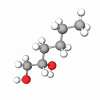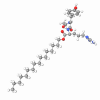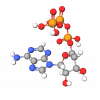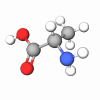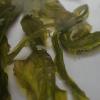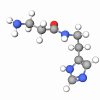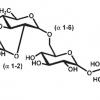Glycoproteins a soluble mucoproteins derived from yeast cell walls, having a molecular weight between 10,000 and 20,000. Composed of oligosaccharides (consisting of 5 to 10 sugar units) and a protein core, it is in the form of a water-soluble material with a globular structure. It deposits an elegant, flexible, moisture-retentive film on the skin and hair. Testing on eyelashes has shown that Glycoproteins have a measurable thickening effect.
Proteins and carbohydrates have long been regarded as distinct classes of natural products. Proteins are considered the key to life and are responsible for most of the dynamic processes carried out by the cells. Carbohydrates play multiple roles in all organisms, serving as either structural materials or as energy sources. These two classes of biomolecules can form complexes that are quite common in living tissues, performing a variety of functions. Glycoproteins and mucoproteins are examples of such complexes.
Mucoproteins, also called mucins, are high molecular weight biomolecules with a higher carbohydrate content than that found in typical glycoproteins. Their structure allows them to form viscous solutions similar to glycosaminoglycans. Mucoproteins function to lubricate and protect the cells and tissues. The protective function is primarily physical; the viscous solutions form a tenacious layer ameliorating abrasion and dehydration.
The pervasive nature of the secretions left by mollusks is a familiar example of the protective and moisture-binding properties of mucoproteins. The presence of these materials in the digestive tract suggests that mucoproteins are capable of protecting epithelial cells from digestion by the proteolytic agents found in digestive fluids. The mucoproteins form a network that excludes the proteolytic materials. The network is slowly degraded but the digestive materials are replaced through continual synthesis.On the skin surface, it is suggested that the mucoproteins produced by the cell membrane maintain the integrity of protective skin cells from microbial attack. Mucins readily offset the drying effects of the environment or more aggressive surface compounds.
Glycoproteins impart a very soft after-feel on the skin, due to the moisture-retentive film that is cast. It is capable of replacing the cementing substances that have been leached from the hair by surfactant activity and degradation as a result of exposure to sunlight.
Glycoproteins will afford longer wearing cosmetics due to their substantive film-forming capabilities. It is an effective hair thickener. It is used in between 0.5 - 5.0 % concentrations.
